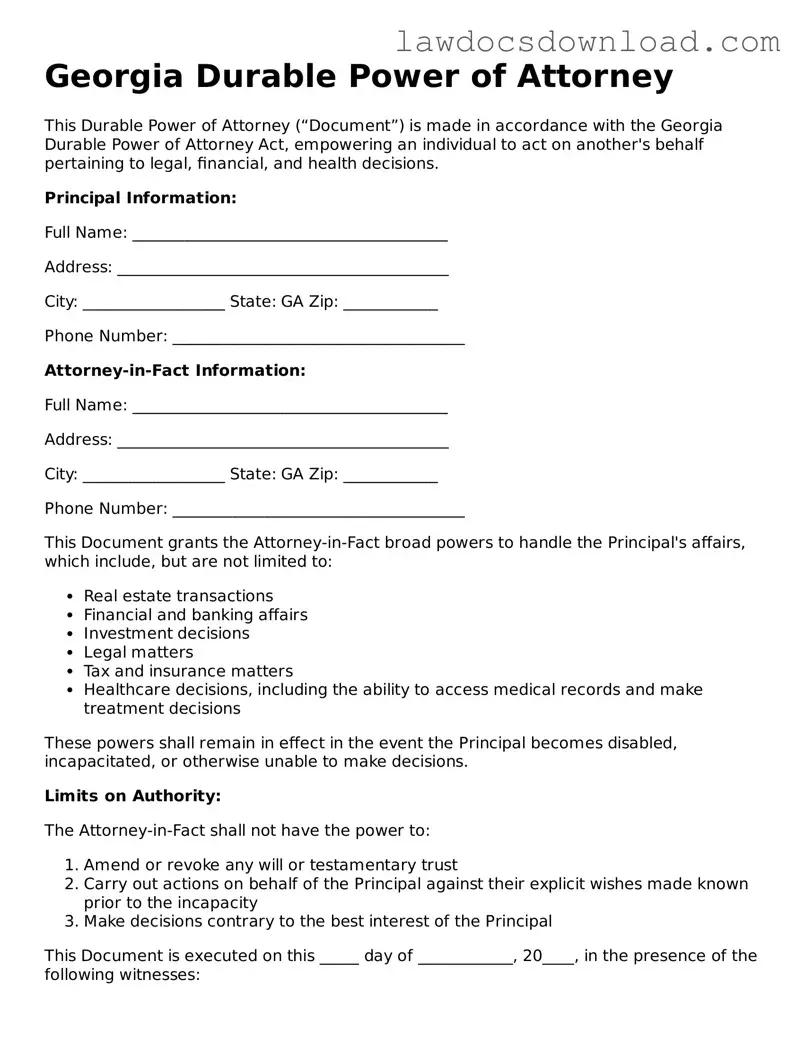Georgia Durable Power of Attorney
This Durable Power of Attorney (“Document”) is made in accordance with the Georgia Durable Power of Attorney Act, empowering an individual to act on another's behalf pertaining to legal, financial, and health decisions.
Principal Information:
Full Name: ________________________________________
Address: __________________________________________
City: __________________ State: GA Zip: ____________
Phone Number: _____________________________________
Attorney-in-Fact Information:
Full Name: ________________________________________
Address: __________________________________________
City: __________________ State: GA Zip: ____________
Phone Number: _____________________________________
This Document grants the Attorney-in-Fact broad powers to handle the Principal's affairs, which include, but are not limited to:
- Real estate transactions
- Financial and banking affairs
- Investment decisions
- Legal matters
- Tax and insurance matters
- Healthcare decisions, including the ability to access medical records and make treatment decisions
These powers shall remain in effect in the event the Principal becomes disabled, incapacitated, or otherwise unable to make decisions.
Limits on Authority:
The Attorney-in-Fact shall not have the power to:
- Amend or revoke any will or testamentary trust
- Carry out actions on behalf of the Principal against their explicit wishes made known prior to the incapacity
- Make decisions contrary to the best interest of the Principal
This Document is executed on this _____ day of ____________, 20____, in the presence of the following witnesses:
Witness 1:
Full Name: ________________________________________
Address: __________________________________________
City: __________________ State: GA Zip: ____________
Phone Number: _____________________________________
Witness 2:
Full Name: ________________________________________
Address: __________________________________________
City: __________________ State: GA Zip: ____________
Phone Number: _____________________________________
The Principal, Attorney-in-Fact, and witnesses declare under penalty of perjury that the Principal is of sound mind and under no constraint or undue influence. This Document is effective immediately and shall remain effective until revoked by the Principal in writing and delivered to the Attorney-in-Fact.
Principal Signature: ________________________________
Attorney-in-Fact Signature: ___________________________
Witness 1 Signature: _______________________________
Witness 2 Signature: _______________________________
Notarization (if required):
State of Georgia)
County of ____________)
On this _____ day of ____________, 20____, before me, the undersigned notary public, personally appeared ____________________________, known to me (or satisfactorily proven) to be the person whose name is subscribed to the within instrument, and acknowledged that they executed the same for the purposes therein contained.
In witness whereof, I hereunto set my hand and official seal.
Notary Public Signature: _____________________________
My Commission Expires: ___________________________________

